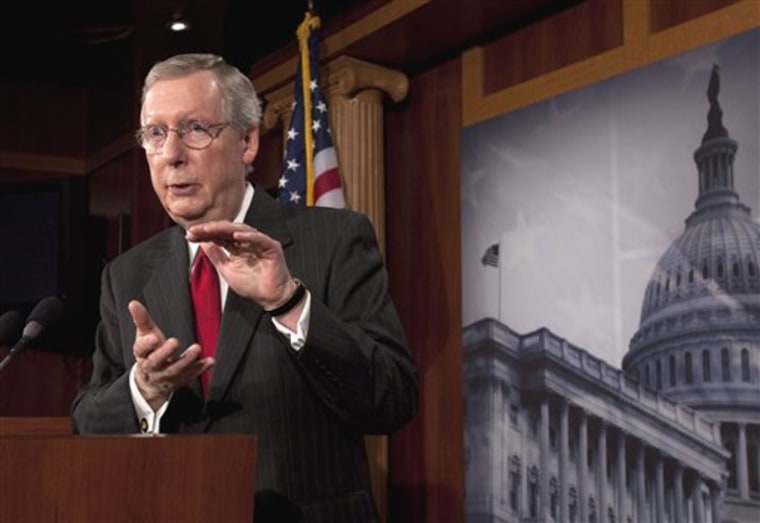Setting the terms for increasing the government's borrowing capacity, the Senate's top Republican on Thursday called for cuts in the day-to-day budgets of government agencies as well as in long-term spending programs such as Medicare and Medicaid.
Senate Republican leader Mitch McConnell laid out his demands to President Barack Obama in a White House meeting.
A few hours later, Vice President Joe Biden expressed confidence that bipartisan talks to tame the nation's growing national debt can achieve "a significant down payment" toward $4 trillion in deficit reduction over the next decade.
The day's developments signaled progress, but also illustrated the difficulty of finding common ground on the larger, more ambitious deficit reduction figure. Neither Biden nor McConnell gave a target dollar figure, though McConnell said: "We're looking for trillions, not billions." McConnell flatly rejected tax increases as a deficit solution this year while Biden said every approach to deficit reduction — from taxes to Medicare — was on the negotiating table. Democrats have been wary of any plan that aims for reductions in the health care program for older adults.
"It's all open for discussion," Biden said, as he emerged Thursday from a two-hour and 15-minute meeting with the six House and Senate lawmakers designated to negotiate deficit reductions.
'Major opportunity'
McConnell, likely to be a key figure in the final agreements negotiated with the White House, said the need to raise the government's borrowing limit posed a "major opportunity" for Republicans and Democrats to come together and do something about the spiraling national debt.
While rejecting tax increases, he also acknowledged that changes to Social Security won't be part of any agreement on raising the debt limit above the current $14.3 trillion cap.
McConnell and Senate Republicans met with President Barack Obama at the White House earlier Thursday and enumerated their priorities for deficit reduction. Later, McConnell lent his strong backing to the work undertaken by Biden and the bipartisan group of lawmakers.
McConnell said that there's been lots of spadework done to bring spending cut options to the talks. While not supporting specifics, McConnell cited the work of Obama's deficit commission, which recommended cuts to farm subsidies, curbing student loan subsidies, and auctioning radio spectrum as ways to cut the deficit. Obama has also proposed $354 billion by 2021 in savings from Medicaid and from cuts to Medicare providers.
"We have plenty of study on the various options to reduce spending," McConnell said. "It's a question of which ones are we going to pick up and do."
White House spokesman Jay Carney said Obama listened to the Republicans' proposals during 75-minute meeting, but said the parties did not use the opportunity to bargain over the budget.
"I don't think when you have 50-odd people in a room you're going to get a lot of negotiating done," Carney said. "This was an exchange of ideas."
Carney: Everyone agrees on need to raise debt ceiling
While McConnell and other Republicans have said they could only vote to increase the nation's borrowing limit if there was agreement on substantial spending cuts, Carney said during the meeting at the White House "everyone in the room, at least who spoke to that issue, agreed that we absolutely have to raise the debt ceiling, which was a good thing."
The White House meeting came a day after Obama met with Senate Democrats and told them not to adopt unyielding positions in the budget talks. He warned that painful spending cuts lie ahead.
Earlier Thursday, House Speaker John Boehner, R-Ohio, seemed to dismiss an idea of adding spending targets — backed up by automatic cuts in both agency budgets and benefit programs like Medicare — as a means to ensure budget savings. Obama himself has come out in favor of the idea — though only if the threat of automatic tax increases is part of meeting the deficit target.
"I don't want phony caps I don't want phony targets," Boehner said. "All the gimmicks that have been used in the past have never worked. Congress has found a way to wiggle out of all of them." Obama's idea of automatic tax increases is a nonstarter with Republicans.
